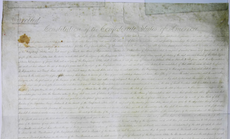Jabez L. M. Curry
Jabez Lamar Monroe Curry | |
|---|---|
 Sculpture by Dante Sodini, formerly part of the National Statuary Hall Collection | |
| Personal details | |
| Born | June 5, 1825 Lincoln County, Georgia |
| Died | February 12, 1903 (aged 77) Asheville, North Carolina |
| Nationality | American |
| Occupation | Lawyer, soldier, professor |
Jabez Lamar Monroe Curry, also known as J. L. M. Curry, (June 5, 1825 – February 12, 1903) was a lawyer, soldier, U.S. Congressman, college professor and administrator, diplomat, and officer in the Confederate States Army during the American Civil War.[1]
Biography
Curry was born in Lincoln County, Georgia, the son of Jabez and Rebecca Jordan Curry. His father, scion of a prominent Southern family, was cousin of Mirabeau Buonaparte Lamar, the second president of the Republic of Texas and husband of Tabitha Burwell Jordan, J.L.M. Curry's aunt. Curry grew up in Alabama and graduated from the University of Georgia in 1843 where he was a member of the Phi Kappa Literary Society. While studying at Harvard Law School, Curry was inspired by the lectures of Horace Mann and became an advocate of free universal education. He served in the Mexican-American War; in the Alabama State Legislature in 1847, 1853, and 1855; in the United States House of Representatives in 1857–61; and in the Confederate Congress. As a lieutenant colonel in the Confederate Army, he was a staff aide to General Joseph E. Johnston and General Joseph Wheeler.

After the war he studied for the ministry and became a preacher, but the focus of his work was free education in the South. He traveled and lectured in support of state normal schools, adequate rural schools, and a system of graded public schools. He was president of Howard College, Alabama, and a professor at Richmond College, Virginia. From 1881 until his death he was agent for the Peabody and Slater Funds to aide schools in the South and was instrumental in the founding of both the Southern Education Board and the first normal school in Virginia, now known as Longwood University. The Curry School of Education at the University of Virginia is named for him, as is the Curry Hall dormitory at Longwood.
Curry served as envoy extraordinary and minister plenipotentiary to Spain during 1885–1888 and as ambassador extraordinary to Spain on the coming of age of King Alfonso XIII in 1902. His publications include works on education, American government, and Spanish history. He was awarded the Royal Order of Charles III and several honorary degrees. Curry died on February 12, 1903, and is buried in Richmond, Virginia. His wife is buried in Talladega, Alabama, where their home, the J.L.M. Curry House, also called the Curry-Burt-Smelley House, still stands, a National Historic Landmark today.
Until October 2009, Jabez Lamar Monroe Curry was honored by one of Alabama's two statues in the United States Capitol's National Statuary Hall Collection. It was donated in 1908 and sculpted by Dante Sodini. In October 2009, the statue was replaced with one of Helen Keller, and Curry's statue went to Samford University.
Works
- Constitutional Government in Spain (1889)
- William Ewart Gladstone (1891)
- The Southern States of the American Union (1894)
- Difficulties, Complications, and Limitations Connected with the Education of the Negro (1895)
- Civil History of the Government of the Confederate States, with some Personal Reminiscences (1901)
References
- ^ Bailey, Hugh C. "Jabez Lamar Monroe Curry". Encyclopedia of Alabama. Retrieved 17 June 2015.
External links
- NSHC biography
- The South in the Olden Time. Harrisburg, Pa.: Harrisburg Publishing Company, 1901.
- History of the University of Georgia by Thomas Walter Reed, Thomas Walter Reed, Imprint: Athens, Georgia : University of Georgia, ca. 1949
- Beach, Chandler B., ed. (1914). . . Chicago: F. E. Compton and Co.
- 1825 births
- 1903 deaths
- 19th-century American diplomats
- 19th-century American politicians
- Alabama Democrats
- Ambassadors of the United States to Spain
- 19th-century American historians
- Confederate States Army officers
- Democratic Party members of the United States House of Representatives
- Deputies and delegates of the Provisional Confederate Congress
- Harvard Law School alumni
- Longwood University people
- Members of the Confederate House of Representatives from Alabama
- Members of the United States House of Representatives from Alabama
- People from Lincoln County, Georgia
- People of Georgia (U.S. state) in the American Civil War
- Signers of the Confederate States Constitution
- University of Georgia alumni

